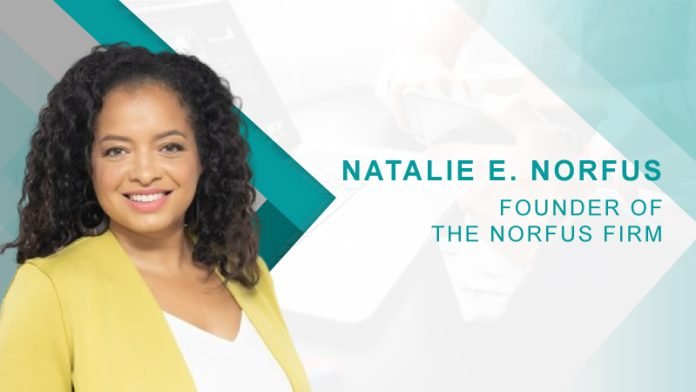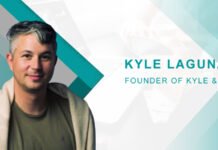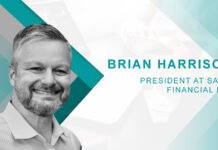Natalie, with nearly two decades of experience in labor and employment law and HR, and as the founder of The Norfus Firm, what key experiences led you to become a leading voice in DEI?
“A strong thread through my upbringing is the concept of being layered. My parents are from very different backgrounds. My mom was White and Jewish – many members of her family came to the US during the Holocaust. My dad is Black and Christian – he was born in the south but moved to northeast Ohio when he was a toddler with my grandparents so that my grandpa could work in a steel mill.
What’s cool about these diverging backgrounds is that I’ve always gotten to see life from different perspectives. For example, I’ve attended synagogues for Passover and eaten gefilte fish at Seder. I regularly attended church and on big holidays like Easter or Christmas, church service was followed by big family dinners with things like mac n cheese and potato salad. I also moved back and forth between my parents after my mom moved to Washington, D.C. when I was 11. My first solo flight at 11 was the beginning of many that pushed me to learn how to navigate travel, be aware of my surroundings and much more. So, I’ve always been in tune with identity and its multi-dimensions…
I credit my upbringing and being exposed to many different elements of people, culture, religion, and food as my “unofficial” start in DEI. But my “official” start in the work was as a summer associate in a law firm 20 years ago where I was asked to serve on the firm’s first diversity committee. From there, I’ve advised clients on all aspects of DEI, which helped me land as the Chief Diversity Officer of iconic multi-billion-dollar fast food brands before starting my own firm in 2019. Now, we work with companies all over the world across every sector on their DEI strategies using a tailored, data-driven approach.”
As a DEI and HR expert, what workplace trends do you foresee in 2024, and how do you expect these trends to shape the future of work?
“3. PURSUE EMPLOYER OF CHOICE STATUS.
In 2023, many of our client organizations struggled to recruit. As they attempt to attract top-quality talent, we expect 2024 to be the year that organizations work on branding themselves as employers of choice. Within that, different trends are emerging to define what a contemporary employer of choice looks like. Many professionals are looking for flexible work options, extensive DEI programming, and shored-up benefits inclusive of a wide range of identities and family structures. In 2024, we expect organizations to focus more on attracting top-quality talent through these policies.”
Given your expertise in DEI, how do you anticipate organizations advancing DEI initiatives in the workplace in 2024?
“2. FRESH APPROACHES TO EMPLOYEE ENGAGEMENT ARE A MUST!
Since 2020, it has become increasingly clear that DEI isn’t just a tick-box training here and there, or a perfunctory email acknowledging heritage months. DEI is integrative and holistic, and people need to be inspired to engage in new ways. We’ve invited our clients to consider new formats for communicating about DEI. Some suggestions we love include audio-visual interviews with DEI champions, and using data as an effective storytelling tool to show off DEI wins.”
How do you see the intersection of technology and HR evolving in 2024 to enhance workplace experiences?
“AI WILL CONTINUE TO EVOLVE – AND DOMINATE WORKPLACE CONVERSATIONS.
While 2023 will definitely be remembered as the year of Chat GPT, 2024 will be the year that generative AI’s role in DEI & HR begins to crystallize. AI has huge potential to streamline processes and aid brainstorming. We’ve been busy exploring the potential of AI in our own work and – with all the benefits we’ve seen including space for more strategic thinking – there are definitely pitfalls. 2024 will bring many discussions about the ethical limits of AI, the biases that creep into software like Chat GPT, and the need to upskill workers. To learn more about The Norfus Firm’s suggestions for responsible AI use, click here.”
“2. Get familiar with reputable online search tools. We have found that sites like LinkedIn are treasure troves when looking for candidates – even when you have the help of a recruiter. You can peruse your own online network to see and take advantage of filters that allow you to search by skill, seniority, location, and more to figure out what the talent pool looks like for your open role.
On the job seekers’ side, make sure to keep an updated and active online presence through professional platforms. Your profile can be important to job search success – the posts you create and the content you engage with can make the difference in demonstrating that you know your stuff.”
In 2024, how will organizations address and prioritize the well-being of their workforce?
“We’ve heard about toxic workplaces for decades, but organizations have generally been slow to evolve in addressing the unhealthy behaviors of so-called ‘toxic rockstars,'” Norfus says. “As we see on a daily basis, employees across the board have had enough. They want more intentionality from their leaders in how they behave at work.”
Sixty-four percent of employees say they’ve experienced some form of workplace toxicity, which they’ve defined as a disrespectful, abusive, non-inclusive, unethical and cutthroat environment, according to a 2023 study from job seeking platform The Muse. Of those, 44% blamed not only their direct manager, but the entire leadership team, including HR.
While employees may argue that HR can and should do more to prevent toxic situations from occurring at work, it’s important to understand their role in workplace conflicts, Norfus says.
“HR does not typically have the authority to fire or discipline people,” she says. “Rather, HR advises management teams on how to address problematic behaviors.”
“As for what employers should be doing on top of HR’s efforts The Norfus Group’s head of DEI strategy and wellness facilitator, Shanté Gordon, has always encouraged leaders and managers to resource themselves well, never settle for negative leadership strategies already in place and always welcome criticism and room for improvement.
“Do you have mechanisms in place to listen to your employees, understand the needs of your organization and, most importantly, act on that feedback?” she says. “Because if you aren’t willing to act on employee feedback, you are undoubtedly leaving employee engagement up to chance and your employees won’t trust you.”
In the end, the effort to avoid becoming a toxic workplace is a collective one. Real, long-term changes to culture will take collaboration, communication and innovation from everyone at every level.
“The biggest takeaway is the need for intentionality in the evolution of people’s practices in the workplace,” Gordon says. “To be an employer of today — and the future — it is critical for companies to foster inclusive workplaces, address toxic behaviors promptly, and create environments where employees feel safe and valued.”
What trends do you predict in leadership development, and how can organizations prepare their leaders for challenges in 2024?
“So, what is ‘servant leadership’? At The Norfus Firm, we define it as a leader’s lack of preoccupation with their own interests and advancement while also prioritizing the needs of their team or organization. Servant leaders are typically resilient and can withstand the pressures and setbacks of leadership—all while maintaining their focus on serving others.”
With remote work becoming commonplace, how do you foresee the evolution of remote work, and what challenges and opportunities will organizations face in fostering a balanced hybrid work environment?
Embrace remote work. The pandemic taught us that office workers can produce quality work product from home (and save time and money by avoiding long commutes). Indeed, some companies had record years performance-wise when their teams were working from home. While many companies have required their office workers to return to the office, most candidates desire a fully remote or hybrid work arrangement. So, it is critical to be flexible about how and where people work.”
Given your experience, what advice would you offer to HR professionals and business leaders aiming to implement effective DEI strategies and stay informed on workplace trends?
“3. Be A Business Partner And An Employee Resource
It is critical to strike a balance between being a business partner who helps advance people strategies and continuing to be a “resource” for employees. There can be tension between the two, given today’s high-paced business demands. But, if an HR leader is seen as an extension of upper management, it can set the tone for distrust of HR, which can increase risk and undermine business initiatives. – Natalie Norfus, The Norfus Firm, PLLC”
Explore HRtech News for the latest Tech Trends in Human Resources Technology.

Natalie E. Norfus Founder of The Norfus firm
Natalie E. Norfus is the founder of the influential The Norfus Firm and outspoken co-host of the “What’s the DEIL?” podcast for organizational leaders as they make their way along their HR journey. In this podcast, Natalie explores how leaders can create space for authentic human connection through the lens of DEI. She focuses on practical HR strategies and best practices that improve employee engagement, retention, and impact.












